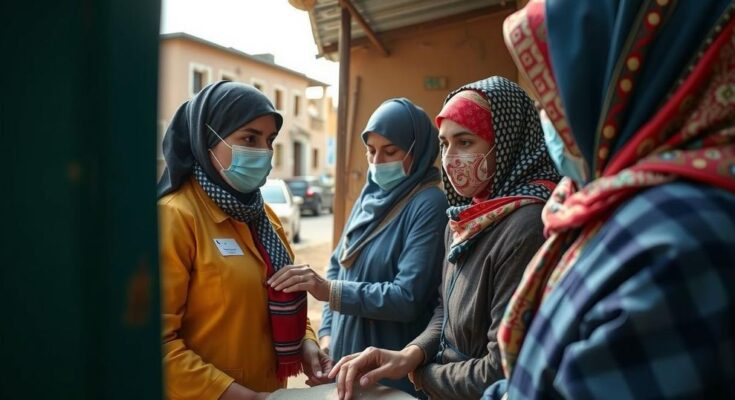In September 2023, Morocco was devastated by a 6.8 magnitude earthquake that resulted in significant loss of life and extensive damage, particularly affecting rural communities. Midwives from AMSF, with support from ICM and funding from Direct Relief, provided critical medical care through mobile clinics, addressing both physical and psychological needs of impacted individuals, especially pregnant women. The initiative also emphasizes future preparedness through training programs designed for midwives, ensuring they are equipped to respond effectively to future humanitarian emergencies.
In September 2023, Morocco experienced a catastrophic earthquake registering a magnitude of 6.8, resulting in extensive destruction and loss of life, particularly in the rural regions of the Atlas Mountains. The natural disaster resulted in over 2,900 fatalities and left more than 5,500 individuals injured. Among the most vulnerable populations were pregnant women, who faced immense challenges in the aftermath, having lost their homes and family members while also confronting critical health risks. In response to this dire situation, midwives from the Association Marocaine des Sages-Femmes (AMSF), supported by the International Confederation of Midwives (ICM), rose to the occasion, providing essential healthcare and support to those affected. Utilizing funds from Direct Relief, AMSF operated five medical caravans throughout the afflicted regions, including Saidate, Tighdouine, Zerkten, Onein, and Timzdagiouine. Additionally, in collaboration with ICM, a sixth caravan was conducted to Ouirgane in the Province of Al Haouz, an area that required urgent assistance. On January 13, 2024, AMSF midwives, alongside a multidisciplinary team of healthcare professionals, established a mobile clinic in Ouirgane. Within just one day, they catered to 169 patients, providing prenatal care, general medical consultations, and screenings for various health conditions such as HIV, diabetes, and hypertension. Moreover, they conducted ultrasounds to monitor fetal health and facilitated educational sessions focusing on family planning, nutrition, and breastfeeding. The team did not stop at medical services; they distributed 140 dignity kits, 10 newborn kits, and winter clothing to families displaced by the disaster. For patients requiring advanced medical care, the midwives ensured referrals to more comprehensive healthcare facilities like the Marrakech University Hospital. Furthermore, the midwives offered psychological support to women impacted by the earthquake, conducting both individual and group counseling sessions aimed at addressing trauma and loss. They also provided resources and coaching for women who had experienced gender-based violence, underscoring the compassionate role of midwives within their communities. One of the major hurdles faced was the difficulty in accessing remote areas where health facilities had either been damaged or rendered inaccessible due to the earthquake. Nevertheless, the AMSF midwives capitalized on their strong community ties to ensure aid reached those most in need. As Morocco embarks on its rebuilding phase, AMSF and ICM are prioritizing future crisis preparedness. To this end, AMSF has requested additional training for its members, an initiative supported by ICM through the development of the “Ready to Respond: A Midwife’s Guide to Humanitarian Action” program. This comprehensive training is designed to equip midwives with the necessary skills to act decisively and effectively during emergencies, including disaster management and the provision of respectful maternity care in humanitarian contexts. A three-day Train the Trainer (ToT) program organized by ICM in May 2024 in Rabat enabled AMSF midwives to acquire critical skills such as assessing needs during crises, managing newborn care in emergencies, and advocating for the integration of midwives in national emergency response frameworks. Empowered by this training, midwives will be better positioned to safeguard the well-being of their communities and to champion the development of robust, inclusive health systems in anticipation of future emergencies. The collaboration among Direct Relief, ICM, and AMSF exemplifies the pivotal role midwives can play during crises. As the earthquake-impacted communities gradually recuperate, the unwavering commitment of these midwives provides not only essential healthcare but also hope and stability for those affected. A video documenting the caravan’s efforts in Ouirgane captures the resilience and dedication of these midwives as they contribute to Morocco’s recovery efforts.
The earthquake that struck Morocco in September 2023 not only devastated infrastructure but also exacerbated health risks, particularly for vulnerable groups such as pregnant women. The initiative by midwives to provide immediate care in the aftermath highlights their essential role in humanitarian emergencies. The actions of midwives facilitated crucial healthcare services while fostering community resilience and psychological support in a challenging and transformative period.
In summary, the response of the AMSF and ICM to the earthquake in Morocco showcases the vital role of midwives in emergency situations. Their commitment to providing comprehensive healthcare, emotional support, and education in the wake of a crisis is instrumental in aiding community recovery. The ongoing training initiatives aimed at enhancing midwives’ crisis preparedness ensure that they are better equipped to address future emergencies effectively, reinforcing the importance of collaborative efforts among health professionals and organizations.
Original Source: internationalmidwives.org




